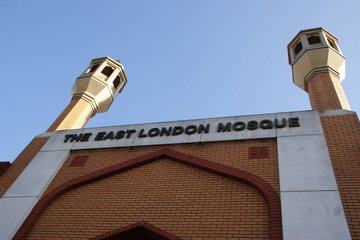
East London Mosque and Islamic Cultural Centre
Mosque in the East End of London that dates back to 1910
Location(s)
London
E1 2NE
United Kingdom 46-92 Whitechapel Road
London
E1 1DN
United Kingdom
About
In November 1910 a fund for a mosque in London was established. By 1926 a Deed of Trust had been executed and the fund became known as the London Mosque Fund. Trustees included distinguished Muslims such as Syed Ameer Ali, Firoz Khan Noon and the Aga Khan, as well as sympathetic British peers. Until 1928 the trustees arranged for prayers to be held at various addresses in west London. Poor attendance and the eventual realization that the majority of Muslims in London lived in its East End led to the relocation of prayer meetings to the King’s Hall on Commercial Road in 1935. At this point, the trustees handed over the organization of prayer meetings and religious functions to the Jamiat-ul-Muslimin, an east London-based organization.
The desirability of a mosque to meet the needs of the many seamen and other working-class Indians who inhabited the East End and attended these meetings was keenly felt, and in 1940 three adjoining houses on Commercial Road were purchased and converted into the East London Mosque. The mosque was inaugurated by the Egyptian Ambassador, Hassan Nachat Pasha, at a ceremony that took place on 1 August 1941. The ceremony was attended by approximately 300 people, including representatives from the Indian Company of the Pioneer Corps, and speeches were made by Sir Hassan Suhrawardy (Muslim Advisor to the Secretary of State for India), Sir Ernest Hotson (on behalf of the London Mosque Fund Trust) and Said Amir Shah and Ahmed Din Qureshi (as officials of the Jamiat-ul-Muslimin).
Also located at the East London Mosque was the Indigent Moslems Burial Fund, which raised money to provide for the burial of Muslims in Britain and the upkeep of their graves. The Islamic Cultural Centre, which was still in need of funds and at the planning stage in the mid-1940s, aimed to provide ‘secular education combined with facilities for vocational and technical training in an Islamiah Madrassah’.
Inauguration ceremony, 1 August 1941
Dispute between the Jamiat-ul-Muslimin and the trustees of the East London Mosque regarding the management of religious ceremonies and other duties, October 1943
Abdullah Yusuf Ali (trustee), Syed Ameer Ali (original member of the Board of Trustees for the London Mosque Fund), Waris Ameer Ali (trustee), Munshi Ghulam Mohammed Buta (Arab who led prayers at the mosque), Sir Ernest Hotson, the Aga Khan (President of the Board of Trustees), Sahibdad Khan (Secretary of the Jamiat-ul-Muslimin), Firoz Khan Noon (High Commissioner of India in England, 1936–41, and trustee), Hassan Nachat Pasha, Said Amir Shah (Treasurer of the Jamiat-ul-Muslimin), Hassan Suhrawardy (Muslim Advisor to Secretary of State for India, Chairman of the Board of Trustees).
Ayub Ali (Treasurer of the East London branch of the India League, involved with Jamiat), Dr Mohammed Buksh (original President of the Jamiat), Allah Dad Khan (involved with Jamiat, Treasurer at some point), Ghulam Mohammed (Co-Secretary of the Jamiat), Ahmad Din Quereshi (silk merchant and Co-Secretary of the Jamiat).
Central Mosque, Regent's Park, London
Ansari, Humayun (ed.) The Making of the East London Mosque, 1910–1951 (Cambridge: Cambridge University Press/Royal Historical Society, 2011)
Visram, Rozina, Asians in Britain: 400 Years of History (London: Pluto Press, 2002)
L/PJ/12/468, India Office Records, Asian and African Studies Reading Room, British Library, St Pancras
L/PJ/12/646, India Office Records, Asian and African Studies Reading Room, British Library, St Pancras
For image and copyright details, please click "More Information" in the Viewer.
Image credit
Photo of East London Mosque on Whitechapel Road
Photo by FarzanaL 2012, Flickr, https://creativecommons.org/licenses/by-nc/2.0/
